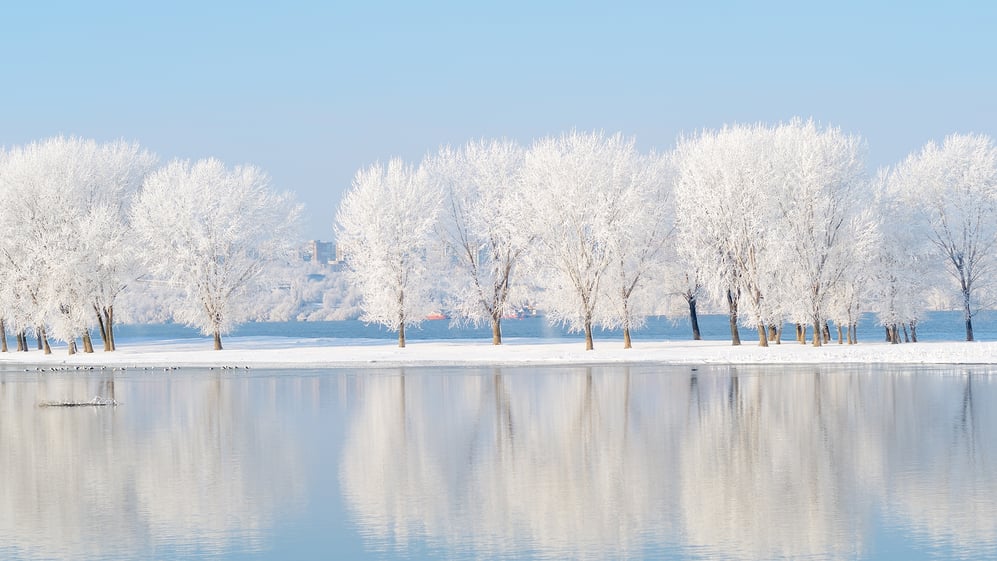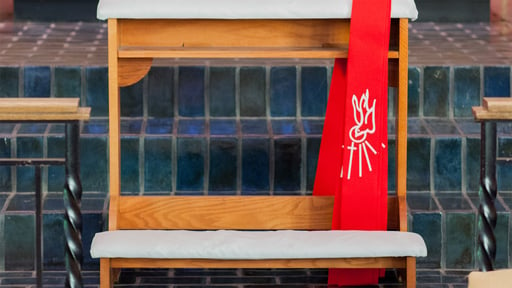I hate winter.
I live in Michigan, which is probably one of the worst states to live in if you hate the cold and snow like me. Winter starts in November, and it doesn’t end until late March. I hate trudging through snow to take my dog out, driving on icy roads, and putting on a million layers just to walk to my mailbox.
Like most of the United States in the past few weeks, Michigan has been covered in snow. For people in Texas and other southern states, the snow was absolutely detrimental, causing people to lose power for days.
We’re deep in the throes of winter — the end isn’t quite in sight yet, and the temperatures won’t rise above freezing any time soon. And I’m tired.
If you’re like me and are sick of waking up every day to a barren, snowy landscape, here are a few ways we can find joy in winter, thanks to some words from Scripture! (The Bible actually talks a lot about snow, despite the fact that we always think the Bible takes place in a hot desert. But in winter, snow often falls on the central highlands, including Jerusalem, and stays on the summit of Mount Hermon from winter into spring.)
The Forgiveness of Sins
One of the most common references to snow in the Bible is in relation to the forgiveness of sins. After David committed adultery with Bathsheba and the prophet Nathan confronted him with his sin, David wrote Psalm 51. Much of our liturgy’s confession and absolution is based on this psalm!
“Purge me with hyssop, and I shall be clean;
wash me, and I shall be whiter than snow.” (Psalm 51:7)
And the prophet Isaiah similarly compares our sins to the color scarlet, and our forgiven sins to the whiteness of snow:
“Come now, let us reason together, says the Lord:
though your sins are like scarlet,
they shall be as white as snow;
though they are red like crimson,
they shall become like wool.” (Isaiah 1:18)
How fitting that we’re in the season of Lent and talking about these verses! As you weather the winter storms and journey through the season of Lent, remember that your sins are completely forgiven by the blood of Jesus — they are white as snow.
God’s Providence
In the Book of Job, young Elihu acknowledges that God causes the snow: “For to the snow he says, ‘Fall on the earth,’ likewise to the downpour, his mighty downpour” (Job 37:6).
When the Israelites were in the desert after being delivered from the Egyptians, God provided them food in the form of manna, which is described as “a fine, flake-like thing, fine as frost on the ground” (Exodus 16:14). Six days a week, manna was on the ground in the morning to sustain the people for that day.
Whether we are thinking of God commanding the snow to fall or providing food for His people, God’s providence is made clear in the image of snow. Even in the midst of long winters, snowstorms, and power outages, God is faithful. He provides for His people in a variety of ways and through a variety of means.
God’s Active Word and Fulfilled Promises
It seems like all I do in winter is wait for summer. Nothing happens in the winter (I don’t ice fish), so I spend this entire season dreaming of sunshine and warmth. Winter is traditionally a time of inactivity — no sowing or harvesting plants, and short days and frigid temperatures that prevent some forms of physical activity.
Even if we feel inactive in winter, God’s Word is active no matter the season. The prophet Isaiah writes:
“For as the rain and the snow come down from heaven
and do not return there but water the earth,
making it bring forth and sprout,
giving seed to the sower and bread to the eater,
so shall my word be that goes out from my mouth;
it shall not return to me empty,
but it shall accomplish that which I purpose,
and shall succeed in the thing for which I sent it.” (Isaiah 55:10–11)
As the writer of Hebrews says, “the word of God is living and active” (Hebrews 4:12), and it will always accomplish its purpose — to make God known. God’s Word will always do what it says, and we can hold God to the promises that He makes in Scripture.
The Second Coming of Jesus
Daniel’s prophecy of the second coming of Jesus says, “his clothing was white as snow, and the hair of his head like pure wool” (Daniel 7:9). Likewise, John’s description of Jesus in Revelation is that “the hairs of his head were white like wool, like snow. His eyes were like a flame of fire” (Revelation 1:14).
We don’t know when Jesus will return, but we can certainly look forward to that day, when we will see Jesus face to face, and live in His presence forever. We will likewise be made white as snow, as we will be perfected in the image of Jesus.
Join us for a conversation with Dr. Kim Marxhausen on how God helps us and others through the winter blues.






.jpg?width=50&height=50&name=IMG_20220621_160541_456%20(1).jpg)







